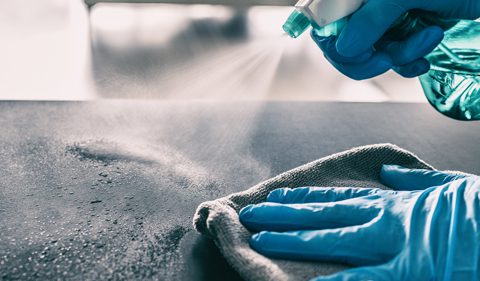
Keeping it Clean
Improving how your business looks and operates now will put you ahead of the game and make it easier to restart your business after lockdown – or launch a brand new service to keep it ticking over.
If you are closed or operating a reduced service, this is a real opportunity to do the many jobs and tasks on your to-do list as well as make improvements that could make your business more attractive and competitive. To get you started, here’s Take Stock’s checklist:
General hygiene
• Deep clean all areas from kitchens and stores to bar and customer seating, restrooms, entrances, corridors, stairs, staff rooms and outdoor spaces.
• Do the dirtiest jobs first – kitchen walls, floors, cabinets and drawers, ovens, extractors, pipes, sinks and drains. It’s worth buying professional degreasing and cleaning chemicals and equipment – but follow safety instructions.
• Deep clean all appliances and finish with bactericide before shutting down if not in use. Ensure there’s no stagnant water trapped to prevent Legionella – and leave doors open. Use a protection spray on all cleaned stainless steel appliances to make them easier to keep clean.
• Deep clean behind and under surfaces, appliances and shelves and wipe down regularly to keep dust down – this will make re-opening easier and faster.
• Restrooms – give them a critical audit followed by any maintenance work and a deep clean. Fixing floors and grouting makes routine cleaning easier and more effective – create a new cleaning rota to keep them looking fresh.
Pests
• Pests are always a problem but infestations can get worse fast if properties are closed and unattended.
• Check that your protection is good enough and working – call in your provider for an audit or visit if possible.
• Flies are a summer problem so leave electric fly killers on and plug sinks/close toilets to prevent breeding.
Utilities
• Turn off hot water – it’ll save money and reduce the risk of Legionella developing.
• If your property is closed, check weekly to make sure there’s no stagnant water where bacteria or Legionella could breed.
• Flush taps, remove any shower heads and check places where water can collect – dishwashers, fridges, plants, drains.
• Save water and money by fixing any drips with new washers.
Food & drink stores
• Check all the use by dates in your dry stores and make sure all vulnerable products are in pest proof containers.
• Check that labels are correct.
• Make sure your storerooms are protected from pests and other issues such as water or damp – and check conditions regularly.
• For food in freezers – check all use by dates and correct labelling. Check temperatures and maintain your records.
Repair & replace
• Get that to-do list out and start ticking off jobs – replace broken light bulbs, fixlocks, glass panes and loose handles, oil creaky doors, resurface or repair floors.
• Closure or partial opening makes this a good time to paint – from complete rooms to touching up heavy traffic areas.
• Clean, repair, polish or re-varnish chairs and tables or other furniture – and clean or replace soft furnishings.
• Sort out any outdoor areas – repair or clean roofs and awnings or umbrellas, patio floors and seating – and get your garden or terrace blooming.
• Cast a critical eye over your frontage and make improvements to increase your appeal to customers after lockdown.
Records & compliance
• This period is an excellent time to review your operations from record-keeping to internal policies – such as food and allergen, safety H&S policies, risks and assessment.
• Update and print out any new processes to take staff through.
• Make sure you maintain all your records and keep them up to date – you may need them for a local authority check – including freezer temperature, pest control etc.
• Review your systems and procedures for food handling preparation, cooking, cooling, reheating and storing – and look for improvements.
• Update or create maintenance andcleaning schedules for all appliances and all areas – and don’t forget ice makers which need weekly sanitising.
• Review your fire safety system and procedures.
• Audit your security and update your keyholder list and passwords.
• Check your staff training and get them- and yourself – up to date with online training courses.

